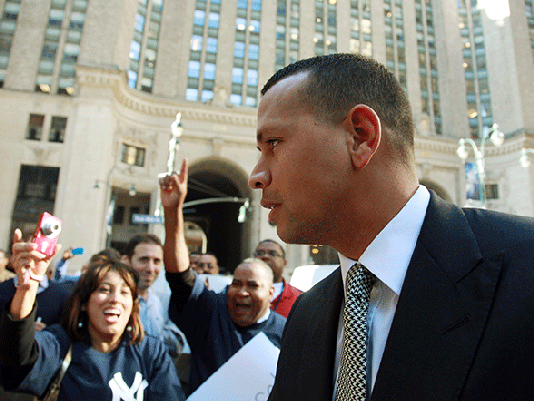Head on over to New York Magazine and check out Steve Fishman’s takeout piece on Alex Rodriguez:
Since his character is part of the story, Rodriguez wanted me to talk to a character witness, and his choice was an odd one: Cynthia, his ex-wife. “You’re going to love her. She’s an amazing lady. I love her to pieces,” he said, “and she’s one of my best friends.”
Cynthia met me in a café in Coconut Grove and then a second time in the elegant though hardly ostentatious home she designed on Biscayne Bay. She’s not just toned but muscular, an attractive, petite blonde with smooth skin and piercing eyes and two bright diamond earrings. She met Rodriguez when he was 21 and she was 22. She wasn’t a sports fan. He told her he played baseball. “That’s great, but what do you really do?” she’d said. Cynthia is a traditional girl from a close-knit, religious family who lived a few blocks from her parents for a time—and she was a college graduate, which impressed Rodriguez. She’d earned a master’s degree in psychology and had practiced as a therapist.
She had every reason in the world to dislike Rodriguez. He’d humiliated her in the press; there were reports of Madonna and Rodriguez together shortly after the birth of their second child. But five years later—they divorced in 2008—she simply said, “I was disappointed.” She still esteems him. In the aftermath of the separation, he was generous and thoughtful. “He really made sure that everything was taken care of,” she told me. “It was a very nurturing process.” For her, that wasn’t an exception. “I saw something in him that I still see in him, and what I see is still very good.”
But she also sees damage. She spooled out the now-familiar story as to its causes. His father left the family when Alex was 10; he lived with his mother and lost touch with his father. The absence of a father made him the man of the house, big pressure for a teenager. “I was in a full sprint to make sure my mother never worked again,” he said.
Rodriguez’s success added to the emotional distortion. “Everything was about growing him as a baseball player,” Cynthia said. “He wasn’t learning anything but how to hit the fastball.
“What happens to everything else? It’s stunted, completely.” Without an authority figure, he listened willy-nilly to the advice of whoever was with him at the time.
“I used to say to Alex, ‘Don’t you just know what to do? Don’t you just have that voice in your head that tells you?’ He said, ‘No. I don’t.’ I think, looking back, he was probably uncomfortable with his place in the world.”
Later, when their marriage was crumbling, Cynthia thought a lot about Rodriguez’s issues. One day, she ran into Cal Ripken, one of his baseball heroes and a friend.
“What is it about Alex that I’m not seeing?” she asked Ripken. “What is it that I don’t get?”
“Cynthia, let me tell you the problem,” he said, and told her a story. “I might be wearing a suit, and Alex will see me and say, ‘Cal, I love your suit. Where did you get that suit?’ Then somebody else might walk in the locker room, and they have a completely different kind of suit on. And Alex might say, ‘Hey, I love your suit.’
“Cynthia, he tries to please everyone. That’s the problem.”
Rodriguez would often be charged with insincerity, but Cynthia didn’t see it that way. “He’s trying to say the right thing, trying to fit in. I would say immature, not insincere.”
[Photo Via: USA Today]




The odds of turning out quasi-normal after being amazingly talented, super rich, and famous at a young age is a long shot. Very long. Not making excuses for Alex. Just an observation.
I think any profession--lawyer, artist, performer, stock trader--where you are so narrow that you don't grow but in one area, yeah, you are going to be a limited, immature person. Absolutely.
I am not an ARod fan. I have to say that I respected him more when he was with the Mariners. He went for every dollar he could get, and who could blame him? However, it is hard to root for the guy. Not that I root against him as a Yankee, and quite the contrary.
He was put in a position where the M's let him go rather than signing him for top dollar, and who can blame them?
This article is right on, and Alex is immature, but I don't find him detestable. He made mistakes like anyone, but when you make that much cheese it is magnified. It it not necessarily his fault, but if you make that much money, there is also an unfair expectation that you will also win. Personal highlights aside, he has just 1 ring.
I think MLB is persecuting him a bit unfairly, but he would have been better served to admit a mistake and say, I did something wrong and I will accept a just punishment, but what they propose is unjust. I don't think he was framed.
As a Yankee fan, I don't think they are better without him playing, but they might be better without his salary eating away at other alternatives (Maybe not this year) and endless distractions.
He is a great looking guy, muscular, super-rich, portrays himself as a victim and plays baseball for a living. What's not to hate?
The ARod article was enlightening but the Sondheim piece by Frank Rich really was wonderful.